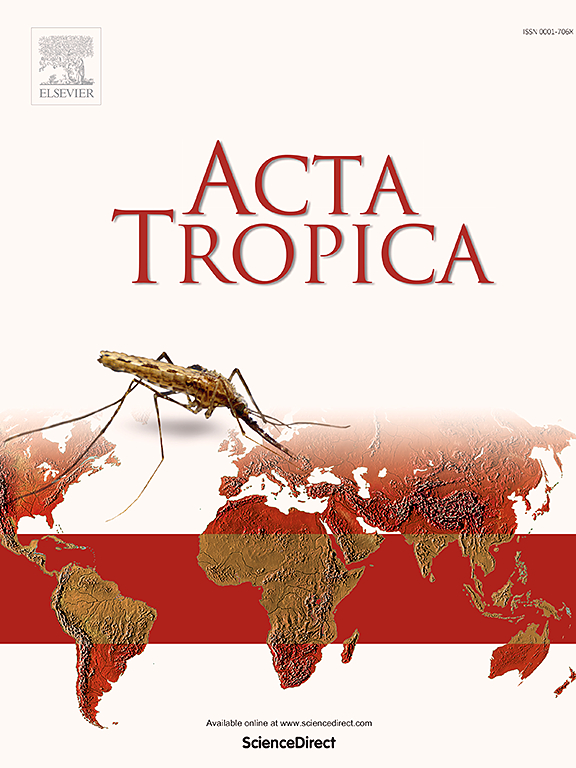基于大气和室温等离子体诱变的高效杀软体细菌的筛选和代谢分析
IF 2.1
3区 医学
Q2 PARASITOLOGY
引用次数: 0
摘要
湖北钉螺是日本血吸虫的唯一中间宿主,因此需要开发低毒、高效、经济的杀螺剂来控制血吸虫病的传播和流行。本研究采用浸泡式生物试验筛选有效的杀螺剂。Bsp粉尘粉(DP)是7种微生物农药中最有效的杀螺剂。分离得到优势菌株3-4,经16S rDNA基因测序鉴定为枯草芽孢杆菌。经大气和室温等离子体(ARTP)诱变,获得了包含214株细菌的突变菌株文库。139株突变株中大部分与亲本株差异不显著,60株与亲本株差异不显著。同时获得了15个具有较高杀螺效果的突变菌株。ARTP-129和ARTP-154表现出最高的阳性突变率,与亲本菌株3-4相比,死亡率增加了64.51%。代谢组学分析表明,突变菌株可能通过调节l-焦谷氨酸(PGA)等代谢物的合成途径来改变杀螺毒性。这些发现表明,ARTP诱变有可能开发出新型有效的杀螺剂来控制血吸虫病。本文章由计算机程序翻译,如有差异,请以英文原文为准。

Screening and metabolic analysis of high-efficiency molluscicidal bacteria based on atmospheric and room temperature plasma mutagenesis
Oncomelania hupensis is the only intermediate host of Schistosoma japonicum, highlighting the need for developing low-toxicity, efficient, and economical molluscicides to control schistosomiasis transmission and prevalence. This study screened for effective molluscicides using O. hupensis in an immersion-based biological assay. Bsp dustable powder (DP) emerged as the most effective molluscicide among seven microbial pesticide samples tested. The dominant strain, designated 3–4, was isolated and identified as Bacillus subtilis using 16S rDNA gene sequencing. Following atmospheric and room temperature plasma (ARTP) mutagenesis, a mutant strain library containing 214 strains of bacteria was obtained. Most of the 139 mutant strains showed no significant difference compared with parental strain and 60 strains showed a decrease. Meanwhile, 15 mutant strains with higher molluscicidal effects were obtained. ARTP-129 and ARTP-154, exhibiting the highest positive mutation rates, demonstrated a 64.51 % increase in mortality compared to the parental strain 3–4. Metabolomic analysis revealed that the mutant strains may alter molluscicidal toxicity by regulating the synthesis pathways of metabolites such as l-pyroglutamic acid (PGA). These findings suggest the potential of ARTP mutagenesis for developing novel and effective molluscicides for schistosomiasis control.
求助全文
通过发布文献求助,成功后即可免费获取论文全文。
去求助
来源期刊

Acta tropica
医学-寄生虫学
CiteScore
5.40
自引率
11.10%
发文量
383
审稿时长
37 days
期刊介绍:
Acta Tropica, is an international journal on infectious diseases that covers public health sciences and biomedical research with particular emphasis on topics relevant to human and animal health in the tropics and the subtropics.
 求助内容:
求助内容: 应助结果提醒方式:
应助结果提醒方式:


